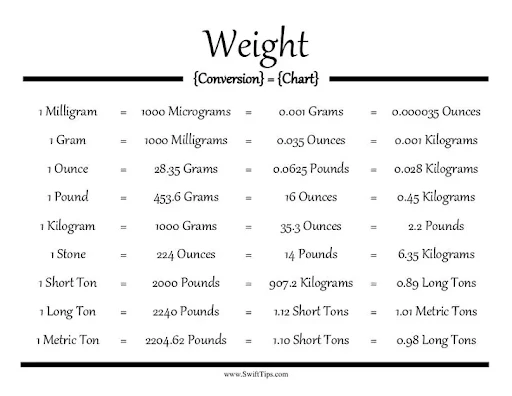
Converting Units of Weight: A Handy Guide for Everyday Life
In our daily lives, we often come across situations where we need converting units of weight from one system to another. Whether it’s for cooking, shopping, or understanding product weights in a foreign country, understanding how to convert weight units is a valuable skill. This guide will provide you with essential knowledge and tips to make weight conversion a breeze.
Understanding Converting Units of Weight
Before diving into conversions, it's important to understand the most commonly used weight units:
- Metric System: The metric system is widely used around the world. The basic unit of weight in this system is the gram (g), with larger weights measured in kilograms (kg).
- Imperial System: Used primarily in the United States, the imperial system measures weight in pounds (lbs) and ounces (oz).
- Other Units: Other units like stones (used in the UK) and troy ounces (used for precious metals) also exist.
Why is Converting Units of Weight Important?
Weight conversion is crucial in many aspects of everyday life, and to do need a weight converter as well. So, be choose the best one and let you daily task with converter.
- Cooking and Baking: Recipes often use different units of measurement. Converting accurately is key to a successful dish.
- Shopping: Product weights might be listed in different units depending on the country.
- Travel: Understanding local weight measurements can be important when traveling.
- Fitness and Health: Tracking weight loss or gain requires understanding these conversions.
Basic Conversion Formulas

Here are some basic formulas for converting between common units:
- Kilograms to Pounds: 1 kg = 2.20462 lbs.
- Pounds to Kilograms: 1 lb = 0.453592 kg.
- Grams to Ounces: 1 g = 0.035274 oz.
- Ounces to Grams: 1 oz = 28.3495 g.
Practical Tips for Conversion
- Use Online Tools: Numerous websites and apps can convert units instantly.
- Learn Key Benchmarks: Memorize a few key conversions (like 1 kg = 2.2 lbs) for quick estimates.
- Understand Rounding: Be aware of how rounding affects accuracy, especially in recipes.
Check this out: The Role Of Probability Calculators In Statistics And Data Science | Using Probability Calculators In Gaming And Gambling Strategies
Conversion in Cooking
Cooking is a common area where weight conversion is essential. Remember:
- Precision is key in baking, so accurate conversions are important.
- Liquid and dry ingredients might need different conversion charts.
Conversion in Shopping
When shopping, especially online or in foreign countries, keep in mind:
- Product sizes and weights can vary significantly between countries.
- Understanding local units can help in comparing prices and quantities.
Conversion in Fitness
In fitness and health:
- Tracking body weight might require conversion if equipment uses different units.
- Understanding both systems is helpful for following international fitness guides or programs.
Advanced Topics in Converting Units of Weight
Beyond the basics:
- Density and Volume: For some items, converting units of weight to volume (like cups to grams) requires knowing the item's density.
- Professional and Scientific Use: Precision matters more in scientific contexts, and professional-grade scales that handle multiple units are used.
Common Mistakes to Avoid
- Confusing Mass and Weight: They are not the same; mass is constant, while weight can change with gravity.
- Ignoring Local Variations: Different countries might have slightly different definitions for units like a pound.
- Over-reliance on Conversion Tools: Understand the basics in case you don’t have access to a tool.
Read More: Choosing The Right Power Converter Tool For Your Needs | Traveling With Confidence Using A Power Converter Tool Abroad
Conclusion
Mastering the art of weight conversion can simplify many everyday tasks. By understanding the basic units and conversion formulas, using practical tips, and being aware of common pitfalls, you can navigate through various scenarios with ease. Whether you're cooking, shopping, traveling, or maintaining your health, these skills will undoubtedly come in handy.
Weight conversion doesn't have to be daunting. With a bit of practice, you'll find it becomes second nature, making your life just a bit easier and more efficient. Remember, the key is to understand the basics and applying them in your daily life. Happy converting!
Free Tools: Free Text To Image Tool Online | Free Favicon Generator Tool Online
Frequently Asked Questions
1. How do I convert kilograms to pounds?
Multiply the weight in kilograms by 2.20462 to get the weight in pounds.
2. What is the formula for converting pounds to grams?
Multiply the weight in pounds by 453.592 to get the weight in grams.
3. Can I easily convert ounces to grams?
Yes, multiply the weight in ounces by 28.3495 to convert to grams.
4. What is the conversion factor from grams to kilograms?
Divide the weight in grams by 1,000 to convert to kilograms.
5. How do you change stones to kilograms?
Multiply the weight in stones by 6.35029 to get the weight in kilograms.
6. Is there a simple way to convert metric tons to pounds?
Yes, multiply the weight in metric tons by 2,204.62 to convert to pounds.
7. How do I convert ounces to pounds?
Divide the weight in ounces by 16 to get the weight in pounds.
8. What's the formula for turning milligrams into grams?
Divide the weight in milligrams by 1,000 to convert to grams.
9. Can I convert kilograms to stones?
Yes, divide the weight in kilograms by 6.35029 to convert to stones.
10. How do I switch between pounds and kilograms?
To convert pounds to kilograms, divide by 2.20462. For kilograms to pounds, multiply by 2.20462.



